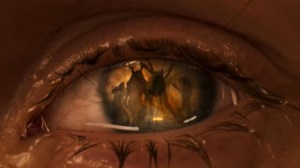Throughout the ’80s, horror fans were given countless stories of masked murderers wreaking havoc on suburban teens, with figures like Michael Myers, Freddy Krueger, and Jason Voorhees earning such pop-culture notoriety that they became more like caricatures of an entire genre than maniacs who could strike fear into the hearts of audiences. The early ’90s saw the genre world pivot into the realm of psychological thrillers with successes like The Silence of the Lambs and Jacob’s Ladder, almost exterminating the effectiveness of the slasher subgenre for good. In 1996, director Wes Craven and Kevin Williamson delivered audiences Scream, which managed to not only be a compelling murder-mystery in its own right, but even found ways to mock the tired tropes of slashers and turned the world of horror cinema on its head. With this year’s Scream, audiences once again witness the effectiveness of the subgenre when it’s firing on all cylinders, yet will also remember the inherent challenges of attempting to reimagine a formulaic concept.
Videos by ComicBook.com
A decade after the last bout of Ghostface murders, the town of Woodsboro is once again being targeted by a copycat killer, though rather than original heroes Sidney Prescott (Neve Campbell), Gale Weathers (Courteney Cox), or Dewey Riley (David Arquette) serving as the connective tissue between the victims, there’s seemingly no pattern. When a new pattern does ultimately emerge, Sidney, Gale, and Dewey do come to provide some assistance, only for their arrival to take the carnage to an entirely new level as our new cast of heroes aims to uncover the truth behind the deadly mystery.
Given just how far the premise of the original films was pushed by the time we got to Scream 4, it’s a difficult task trying to find new ways to pave new ground for the series, though directors Matt Bettinelli-Olpin and Tyler Gillett manage to make the best of those constraints. While previous entries earned a reputation for stunt casting and surprising deaths in their opening scenes, the first minutes of this film harkens back to the original installment. Back in 1996, Drew Barrymore’s Casey reflects on the repetitive nature of slashers, with this year’s Scream instead poking fun at the concept of “elevated horror” and genre efforts that try to set themselves apart from the traditional formula. This opening demonstrates that, while this might be a Scream film, it’s clearly coming from a group of fresh filmmakers who have their finger on the pulse of the genre world in ways that Craven started to lose touch with in later installments. This ultimately sets the tone for the ride that audiences go on, with its narrative and overall themes feeling immensely modern and relevant without ever feeling as though it’s pandering to the audience for cheap accolades.
This surely isn’t to say that the directors are attempting to reboot or entirely reimagine the nature of Scream, more that it feels as unconventional and ambitious for the current age of horror as the original film did, as opposed to setting out just to be the fifth entry in a long-running series. The use of score, shadows, and surprises all fall in line with the tone established by Craven, almost to the point that you could project this film over the original and notice similarities in story structure, as well as cyclical environments. Additionally, there are still moments that seem to channel time-honored methods of startling the audience that go on to merely serve as misdirects, proving that this Scream isn’t just aiming to lampoon the modern state of horror, but also long-held approaches to the genre. One of the biggest differences, however, is that the brutality in this film is far more intense than arguably any other Scream film, as it takes every opportunity to remind us that it’s hard to beat the effectiveness of watching a razor-sharp knife sliding into various parts of a victim when it comes to making us squirm in our seats. In this regard, we’re given what might be the most frightening and unrelenting Ghostface yet, one that feels larger than life but entirely human.
In addition to the ways the Scream series satirizes the genre, another staple is that we meet a variety of characters and potential killers who, over the course of a film’s run time, give the audience and on-screen peers clues that they could be the ones capable of these horrible crimes. As soon as the film starts, a viewer will begin speculating about the identity of Ghostface, which Scream authentically recreates. Unfortunately, this becomes a limiting factor in the enjoyment of the film from a conceptual level, because as the characters throw accusations at one another, the audience can’t help but make their own predictions that evolve over the run time, with the true identity behind Ghostface not really coming as any sort of surprise. Of course, this is the case with virtually every murder mystery in history, but the actual reveals and misdirects likely won’t take viewers as much by surprise.
Luckily, the motivation for the crimes again serves as a reminder of just how fresh the film feels, with writers James Vanderbilt and Guy Busick managing to channel what made the debut movie feel so unexpected. By the time viewers got to Scream 4, it felt relevant yet still came across as being told from the perspective of someone who got their start in the genre 40 years prior as opposed to being the product of up-and-coming voices. The current climate of social media could have easily been incorporated into this Scream to inject a false sense of modernity, with the DNA of the film instead bringing that modernity, revealing exchanges between characters that sound like they could have been pulled straight from social media banter. The characters use phrases that some audiences have likely never even heard spoken out loud, yet don’t make you cringe. With some audiences sure to consider that the Scream franchise died with Craven back in 2015, this installment also makes those voices feel represented when it comes to knee-jerk, dismissive reactions to reviving properties that are too far gone or rebooted merely to cash in on a familiar title.
What undoubtedly makes this Scream feel different from its predecessors is that, while Sidney, Gale, and Dewey have befriended all sorts of characters in previous films (some of which go on to be murderers, admittedly), this film does finally feel like it could pass the torch to a new generation of characters. With films like the Star Wars sequel trilogy of David Gordon Green’s Halloween films, we’ve seen a recent surge of new stories being told in established franchises that have to find ways to honor the past while forging a path forward, with Scream managing to stick the landing of honoring the original stars and what they mean to the series while not feeling like glorified cameos, along with setting the stage that our new survivors might not be done with Ghostface for good.
While the film does manage to walk the line of paying respects to its predecessors and not feeling beholden to outdated tropes, it’s still bogged down by the restraints of its title and the entire slasher subgenre and offers little more than a brutal series of mysterious murders. For some, this will be more than enough and all they expect out of such an endeavor, yet for those who hoped Scream could bring as much to the tiresome formula as the original film, you’ll likely be left wanting more. However, as a love letter to Craven and the impact he left on the genre throughout his career, it is both literally and spiritually for Wes, which is well worth the price of admission for Ghostface fanatics.
Rating: 3 out of 5
Scream lands in theaters on January 14th.








